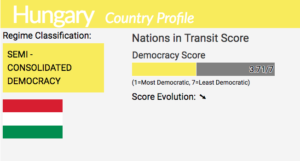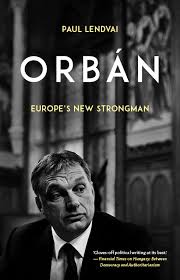 Viktor Orbán is destroying Hungary’s democracy. The institutions, the legal system and the social fabric are nothing but a pile of rubble. And the EU let it happen, argues Beda Magyar, a Hungarian academic, formerly with Central European University (CEU) in Budapest.
Viktor Orbán is destroying Hungary’s democracy. The institutions, the legal system and the social fabric are nothing but a pile of rubble. And the EU let it happen, argues Beda Magyar, a Hungarian academic, formerly with Central European University (CEU) in Budapest.
Instead of simply believing that Hungary is a democracy, the time has come to look for evidence to prove that it is not a dictatorship, she writes in a must-read analysis for Die Zeit (in English):
Instead of the EU or its member states believing that democracy defends itself, the time has come to realize that it is the most fragile of all forms of government, since anybody can make a bid for power. Yet it is exactly this feature that gives democracy its greatest strength: that of relatively quick self-correction. But the tipping point toward self-destruction is visible only in hindsight.
A government spokesman said (HT: Foreign Policy) Hungary will not allow flexibility on its rules for international universities, meaning the Central European University founded by George Soros will likely continue its move to Austria later in the year.
Many of Orban’s domestic policies have been straight out of Russian leader Vladimir Putin’s playbook, says Peter Kreko, an analyst at Political Capital, a Budapest-based think tank.* “Orbán has imposed his will on state media and much of the private-sector media has been bought up by pro-government oligarchs turning them into mouthpieces of the government. That’s similar to what has happened in Putin’s Russia,” he says. Russia has also been a “role model in terms of how to deal with NGOs,” he tells VOA.
“Of course, Orbán can’t go as far as Putin can with Hungary being a member of the EU. I wouldn’t want to say that Hungary is like Russia these days. Russia is a full-fledged authoritarian state, an electoral autocracy where elections are rigged. I think Hungary is becoming a hybrid regime but it is still a place where elections matter. But by the time you arrive at elections, the game has been twisted,” he says.
 This year Freedom House deemed Hungary only “partly free,” the first time in its history an EU member state has been denied the designation “free.”
This year Freedom House deemed Hungary only “partly free,” the first time in its history an EU member state has been denied the designation “free.”
Kreko and other analysts say that Orbán’s attraction to the governance of Vladimir Putin and even China’s Xi Jinping is dictated partly by his critique of Western Europe, VOA adds. “He see Western Europe as less dynamic,” says Julius Horvath, an economic professor at the Sorus-funded Central European University.
 “You know the growth rates of Italy and some other European countries are much lower than Hungary’s. The Hungarian government is in a certain way very pro-business and is happy to attract business wherever it comes from with low taxes or longer working hours,” he adds.
“You know the growth rates of Italy and some other European countries are much lower than Hungary’s. The Hungarian government is in a certain way very pro-business and is happy to attract business wherever it comes from with low taxes or longer working hours,” he adds.
But on the issue of authoritarianism, he adds, the opposition has a mountain to climb, Kreko tells VOA.
“There’s pushback on Orbán here in Budapest among liberals and progressives, but it is not an issue outside Budapest for ordinary people. Orbán really understands the mindset of Hungarian voters: he plays the role of the freedom fighter and his regime delivers. We’ve had considerable economic growth for more than five years now.”
*A partner of the National Endowment for Democracy.







